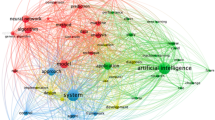Abstract
This paper describes the development of a theory of constructing intelligent systems created to solve problems in arbitrary subject areas. Processes of modeling a subject area are considered, which are based on the use of an ontological representation involving logic and specifications of individual elements of a model as triads consisting of an extensional, an intensional, and a connotation. Definitions of intelligence levels are proposed each of which corresponds to the level of capabilities of an intelligent system.
Similar content being viewed by others
References
V. Yu. Meytus, Introduction to the Theory of Intelligent Systems. Main Ideas, Palmarium Acad. Publ., Saarbrucken (2015).
K. Schwab, The Fourth Industrial Revolution [Russian translation], Publ. House “E,” Moscow (2017).
A. Letichevsky, “Theory of interaction, insertion modeling, and cognitive architectures,” Biologically Inspired Cognitive Architectures, Vol. 8, 19–32 (2014).
F. Baader and W. Nutt, “Basic description logics,” in: F. Baader, D. Calvanese, D. L. McGuinness, D. Nardi, and P. F. Pater-Schneider (eds.), The Description Logic Handbook, Cambridge Univer. Press, Cambridge (2007), pp. 47–104.
V. Yu. Meytus, “Problems of development of intelligent systems,” in: Proc. XXIth Intern. Crimean Conf. “Microwave Technique and Telecommunication Technologies,” Vol. 1 (Sevastopol, September 12–16, 2011), Weber, Sevastopol (2011), pp. 43–46.
M. Mortimer, “On languages with two variables,” Zeitschrift für Mathematische Logik und Grundlagen der Mathematik, Vol. 21, 135–140 (1975).
N. Bostrom, Superintelligence: Paths, Dangers, Strategies [Russian translation], Mann, Ivanov i Ferber Publ., Moscow (2016).
V. Yu. Meytus. “Knowledge in 1-intelligent systems,” in: Proc. 18th Intern. Conf. on System Analysis and Information Technologies (SAIT 2016) (Kyiv, May 30–June 2, 2016), ESC IASA of the NTUU “KPI,” Kyiv (2016), pp. 229–230.
V. Yu. Meytus, “Levels of intelligence in intelligent systems,” in: Scientific Notes of NaUKMA, Vol. 190, Computer Science (2016), pp. 11–15.
A. I. Maltsev, Algorithms and Recursive Functions [in Russian], Nauka, Moscow (1965).
Author information
Authors and Affiliations
Corresponding author
Additional information
Translated from Kibernetika i Sistemnyi Analiz, No. 4, July–August, 2018, pp. 32–44.
Rights and permissions
About this article
Cite this article
Meytus, V. Problems of Constructing Intelligent Systems. Levels of Intelligence. Cybern Syst Anal 54, 541–551 (2018). https://doi.org/10.1007/s10559-018-0055-7
Received:
Published:
Issue Date:
DOI: https://doi.org/10.1007/s10559-018-0055-7




